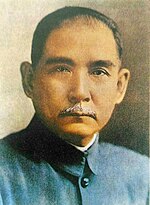The Five Principles of Peaceful Coexistence (Chinese: 和平共处五项原则; pinyin: Hépíng gòngchǔ wǔ xiàng yuánzé) are the Chinese government's foreign relations... 24 KB (2,628 words) - 12:27, 3 April 2024 |
unarmed peoples". Premier Zhou Enlai of the People's Republic of China proposed the Five Principles of Peaceful Coexistence in 1954 during negotiations with... 15 KB (1,844 words) - 02:24, 16 September 2023 |
 | Bandung Conference (redirect from Ten Principles of Bandung) Coexistence), incorporating the principles of the United Nations Charter as well as Five Principles of Peaceful Coexistence was adopted unanimously as item... 32 KB (3,567 words) - 19:54, 15 April 2024 |
 | Non-Aligned Movement (redirect from The Initiative of Five) the Five Principles of Peaceful Coexistence to be used as a guide for Sino-Indian relations called Panchsheel (five restraints); these principles would... 86 KB (7,608 words) - 00:42, 23 April 2024 |
panchsheel, or the five principles of peaceful coexistence, that China proposed and India favoured. The agreement reflected the adjustment of the previously existing... 11 KB (1,139 words) - 05:01, 28 May 2023 |
 | Politics of the Republic of China Three Principles of the Equality (Korean) Five Principles of Peaceful Coexistence Chiangism Dai Jitao Thought Stéphane... 32 KB (3,666 words) - 10:45, 5 April 2024 |
basic form of Buddhist precepts Five Principles of Peaceful Coexistence, enunciated by the People's Republic of China with Indian agreement Panchsheel... 844 bytes (140 words) - 02:57, 21 March 2024 |
1962 Indian parliamentary resolution on China (category Parliament of India) betrayed this goodwill and friendship and the principles of [[Five Principles of Peaceful Coexistence The panchsheel|Panchsheel]] which had been agreed... 3 KB (353 words) - 22:01, 16 April 2023 |
 | Cardinal Principles (Chinese: 四项基本原则; pinyin: Sì-xiàng Jīběn Yuánzé) were stated by Deng Xiaoping in March 1979, during the early phase of Reform and... 5 KB (459 words) - 16:59, 23 March 2024 |
 | five precepts. Phunsap therefore does not see human rights as part of Buddhist doctrine. Dhammika Sutta Five Principles of Peaceful Coexistence, five... 99 KB (11,059 words) - 20:47, 14 April 2024 |
 | People's Liberation Army (redirect from Military of the People's Republic of China) CCP general secretary. Today, the majority of military units around the country are assigned to one of five theater commands by geographical location.... 176 KB (14,660 words) - 02:13, 3 May 2024 |
 | One country, two systems (redirect from Sovereignty of Hong Kong) system of the ROC. Jiang (2008) notes that the concept of "one country, two systems" is based on the Seventeen Point Agreement for the Peaceful Liberation... 76 KB (7,773 words) - 03:39, 3 May 2024 |
Great Chinese Famine (redirect from Chinese famine of 1958-1961) (Chinese: 三年大饥荒; lit. 'three years of great famine') was a famine that occurred between 1959 and 1961 in the People's Republic of China (PRC). Some scholars have... 90 KB (8,947 words) - 06:21, 27 April 2024 |
 | Great Leap Forward (category Economic history of the People's Republic of China) Poland and Hungary, and the perception that the USSR was seeking "peaceful coexistence" with the Western powers. Mao had become convinced that China should... 115 KB (14,170 words) - 06:12, 27 April 2024 |
1953 Five Principles of Peaceful Coexistence.: 56 China's view is that international intervention, especially the use of force under Chapter IV of the... 44 KB (4,994 words) - 22:32, 18 April 2024 |
1954—1962, under the "Five Principles of Peaceful Coexistence, or "pancha shila", ultimately ending with the Sino-Indian War of 1962. Similarly, in the... 3 KB (322 words) - 03:02, 27 February 2024 |
Elections in China (redirect from Electoral system of the People's Republic of China) years but later changed to five, are always supervised by a higher level of government, usually by a County Government. Part of the reason for these early... 34 KB (3,589 words) - 20:21, 27 March 2024 |
these parties and the CCP has officially been described as "long-term coexistence and mutual supervision, treating each other with full sincerity and sharing... 19 KB (1,418 words) - 18:26, 5 April 2024 |
 | anthem of China March of the Volunteers was played for the first time, and the new national flag of the People's Republic of China (the Five-starred... 16 KB (1,729 words) - 16:12, 5 May 2024 |
 | Jawaharlal Nehru (redirect from First Prime Minister of India) premiership of Indira Gandhi and the three-year rule of the Janata Party (1977–1980). Although the Five Principles of Peaceful Coexistence were the basis of the... 219 KB (22,606 words) - 07:23, 3 May 2024 |
 | Nepal (redirect from The Kingdom of Nepal) of China on 1 August 1955, and signed the Treaty of Peace and Friendship in 1960; relations since have been based on the Five Principles of Peaceful Coexistence... 236 KB (22,050 words) - 11:46, 1 May 2024 |
 | China (redirect from Peoples Republic of China) reportedly based on Premier Zhou Enlai's Five Principles of Peaceful Coexistence, and is also driven by the concept of "harmony without uniformity", which... 331 KB (29,348 words) - 07:56, 6 May 2024 |
 | by adding Five more wetlands to the list on the eve of World Wetlands Day 2024 (2nd February)". pib.gov.in. Retrieved 2024-02-03. "Ministry of Environment... 62 KB (646 words) - 05:37, 4 May 2024 |
 | China–India relations (redirect from People's Republic of China-India relations) foreign policy governed by the ethics of the Panchsheel (Five Principles of Peaceful Coexistence). However, there was notable skepticism on the Indian side... 182 KB (18,312 words) - 19:46, 27 April 2024 |
 | Project 985 (section List of Project-985 universities) (Chinese: 985工程) was a higher education development and sponsorship scheme of the Chinese central government for creating world-class higher education institutions... 12 KB (780 words) - 22:37, 30 March 2024 |





